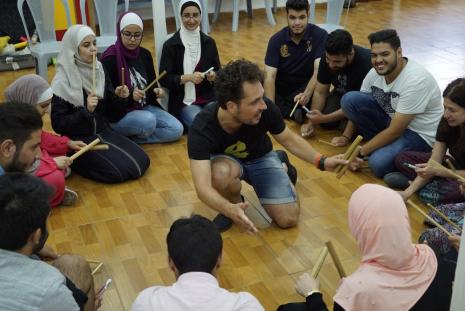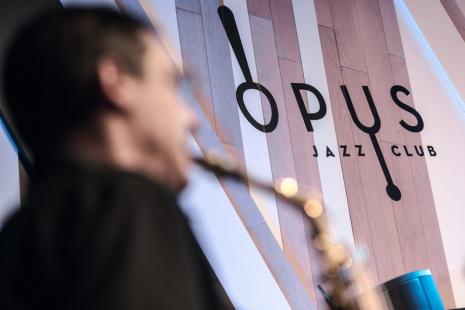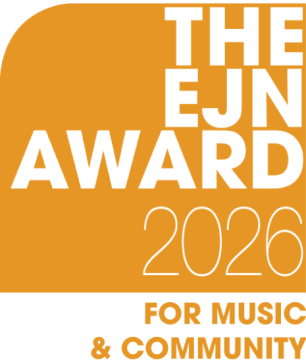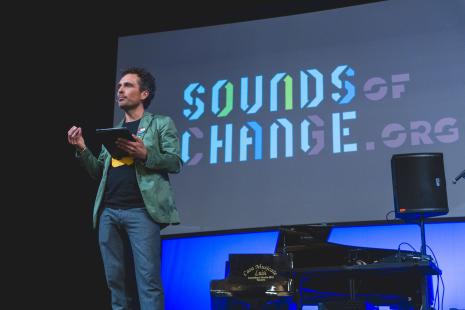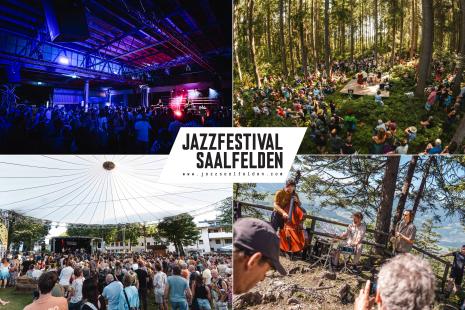Back to list
At the 10th Europe Jazz Conference in September, EJN presented two projects with the 2024 EJN Award for Music and the Community - Bunkern Bokar in Sweden and Taller Obert in Spain.
In this article, we talk to Ebba Westerberg, founder of Bunkern Bokar, about how the project is reimagining what a booking agency looks like, creating professional opportunities in the music sector and building a more inclusive model for the future.
Ebba had been combining a career as a freelance musician with a part-time job at an organisation that provides coaching for people wanting to set up cooperatives and collectives. And as she thought about what to do next, she was struck by an idea.
“Not many jazz groups in Sweden are represented by booking agents. If they’re not famous, they have to book all their gigs themselves, when they would prefer to focus on their artistic development. At the same time, many learning disabled people find it difficult to get a job, people - who with the right training and support - could be part of a team of booking agents. So in 2020, we started Bunkern Bokar to look into the needs of these two groups.”
Key to the success of the project is its location, an office in Kulturföreningen Bunkern, the cultural hub for professional musicians in Gothenburg.
"Bunkern has 30 studios where musicians practice,” explains Ebba. “Having a booking agency embedded in this creative environment is a positive thing for both sides. We help different worlds meet. Our participants feel like 'we’re hanging out in this cool place where musicians hang out’. And musicians see us every day - they can drop in at any time to talk about bookings.”
The model enables participants to gain industry-specific skills while providing musicians with affordable, professional booking services.
Participants gain real-world experience and industry-specific skills from booking gigs to creating websites, making videos and business development, while musicians can access the services of an affordable and professionally-run booking agency, and can keep their focus on making music.
The cultural hub has also been Bunkern Bokar’s first port of call in recruiting musicians to its roster. “It’s been slow and continuous work to build that trust and meet their expectations by booking them gigs “ says Ebba, “but word has spread and now we have a lot of people asking us if they can join us.”
Their methodical approach extends to venue relationships. "We've spent years mapping each venue's booking cycles and communication preferences," explains Ebba. "It's detailed work, but essential for success."
The project takes a methodical approach to building relationships with venues and festivals. "The main thing, and this has taken some time, is mapping out when each venue does their bookings," says Ebba. "We need to know which month they're planning, and how they prefer to be contacted - whether by email, phone or text. It's a big job, but over the last four years we've built up that knowledge.” Bunkern Bokar is also planning a festival, in collaboration with a local arts organisation.
At the same time, the project has developed close links with charities and groups that work with learning disabled people, so that they can refer participants to them.
Some training takes place one-to-one to respond to the specific skills a person wants to develop. Other aspects are in a group setting. For example, everyone is taught skills in finance, writing about music and making videos, and participants take active roles in the weekly project meetings, taking turns to chair and take notes.
The project has also created opportunities for participants to develop in unexpected directions. Ebba explains: "For example, one participant was obviously very happy about being on stage and presenting. I knew there was a school in southern Sweden where he could study to be a musician himself, so I encouraged him to apply. He was successful - it's about seeing different opportunities for people."
Their collective approach includes sharing a single team email identity. "Some people are sensitive to stress," Ebba explains. "This way, no one worries about a backlog of emails after a difficult day or a sick day." While this can occasionally make things more complicated, strong systems and clear protocols make it work and help create a more supportive working environment for everyone.
This is balanced with helping participants adapt to the unexpected things that can crop up when working in the music industry, which can be in contrast to previous experiences, where participants have had very carefully planned days.
The team has also discovered that being personal can be professional. "When we started, we were very eager to look like any other booking agency. Then we invited participants to write personal introductions for each newsletter. Suddenly we got lots of responses - much more than our standard professional updates ever received."
"We can definitely see progress," says Ebba. "One person has moved into their first apartment and started moving around the city independently. Another participant, when he started here, needed to be met at the gate and guided in because he wasn't confident travelling in the city. After a while, it was so easy for him to come here on his own."
"These musicians work hard, but they are not super famous, so it can be difficult to find gigs for them," explains Ebba. "We don't know yet whether it’s possible to make enough money to make the whole project financially sustainable. Maybe we'll have to broaden what we do."
The experience has also challenged some of Ebba’s initial assumptions. "When I started this project, I thought after three years maybe a group of people would be able to take on the whole thing on their own," says Ebba. "But we've realised that our participants will need ongoing supervision and support and that costs money.”
Meanwhile, the project is in discussion with the City of Gothenburg about a potential partnership, including plans to produce concerts at the city museum. "We're going to try lots of different ways of growing our income." says Ebba.
So what has Ebba learned from her experience of setting up and running Bunkern Bokar that could help others considering similar initiatives?
"All the people who've come here have a great interest in music and culture. Don't try to force anyone to do this kind of work if they're not interested in music - I don't think that would work." This genuine connection to the sector proves essential for maintaining professional standards.
She also believes that the project shows how inclusive practices can enhance rather than compromise professional standards. "People who come to work with our team really appreciate being here because of the less stressful environment. When venues get to know our crew, it also creates a kinder environment."
The project also challenges assumptions about roles in the music industry. "Most training places for people with disabilities might be second-hand shops or cafes," reflects Ebba. "We've shown there's a niche for office work in the cultural sector. If you can find the financing to have a team that works with supervision, there are so many different tasks that can be performed."
As the project transitions into its next phase, Ebba offers a clear message: "So many people tell me 'oh what a good project' but the best way to support social enterprises is to buy what they sell. That's how you support us."
Through its work, Bunkern Bokar has proven that inclusion and professional excellence can be two sides of the same coin.
EJN Music and Community Award 2024 winner: A new kind of agency
A new kind of agency
Bunkern Bokar's innovative approach to music industry inclusion
At the 10th Europe Jazz Conference in September, EJN presented two projects with the 2024 EJN Award for Music and the Community - Bunkern Bokar in Sweden and Taller Obert in Spain.
In this article, we talk to Ebba Westerberg, founder of Bunkern Bokar, about how the project is reimagining what a booking agency looks like, creating professional opportunities in the music sector and building a more inclusive model for the future.
Two challenges: one solution
The idea for Bunkern Bokar emerged in 2018 when Ebba Westerberg, a Gothenburg-based musician, took a personal development course and started to reflect on what inspires and motivates her. Ebba had spent years focusing on building her networks and her artistic development. But as she took the course, she recognised that she had space to be more generous with her skills: “I realised that I get inspired and get energy from being part of society and doing more than just thinking about me and my music.”Ebba had been combining a career as a freelance musician with a part-time job at an organisation that provides coaching for people wanting to set up cooperatives and collectives. And as she thought about what to do next, she was struck by an idea.
“Not many jazz groups in Sweden are represented by booking agents. If they’re not famous, they have to book all their gigs themselves, when they would prefer to focus on their artistic development. At the same time, many learning disabled people find it difficult to get a job, people - who with the right training and support - could be part of a team of booking agents. So in 2020, we started Bunkern Bokar to look into the needs of these two groups.”
Creating the model
Fast forward to 2024, and Bunkern Bokar has 50 musicians on its books, and up to ten trainee booking agents on the team at any one time. It has booked over 100 gigs for the musicians on its books and has worked with 15 trainee booking agents. This was made possible through four years of grant funding from the Swedish Inheritance Fund, which distributes money from people who have died intestate.Key to the success of the project is its location, an office in Kulturföreningen Bunkern, the cultural hub for professional musicians in Gothenburg.
"Bunkern has 30 studios where musicians practice,” explains Ebba. “Having a booking agency embedded in this creative environment is a positive thing for both sides. We help different worlds meet. Our participants feel like 'we’re hanging out in this cool place where musicians hang out’. And musicians see us every day - they can drop in at any time to talk about bookings.”
The model enables participants to gain industry-specific skills while providing musicians with affordable, professional booking services.
Participants gain real-world experience and industry-specific skills from booking gigs to creating websites, making videos and business development, while musicians can access the services of an affordable and professionally-run booking agency, and can keep their focus on making music.
Building relationships
At the heart of Bunkern Bokar's approach is a carefully cultivated network of relationships. The project works closely with musicians at the cultural hub, and three of those are musicians now part of the training team. "Most musicians are forced to learn a lot of different skills - dealing with administration, financing, booking, marketing. They are used to taking care of whatever pops up," explains Ebba. This practical industry experience is invaluable in training new booking agents.The cultural hub has also been Bunkern Bokar’s first port of call in recruiting musicians to its roster. “It’s been slow and continuous work to build that trust and meet their expectations by booking them gigs “ says Ebba, “but word has spread and now we have a lot of people asking us if they can join us.”
Their methodical approach extends to venue relationships. "We've spent years mapping each venue's booking cycles and communication preferences," explains Ebba. "It's detailed work, but essential for success."
The project takes a methodical approach to building relationships with venues and festivals. "The main thing, and this has taken some time, is mapping out when each venue does their bookings," says Ebba. "We need to know which month they're planning, and how they prefer to be contacted - whether by email, phone or text. It's a big job, but over the last four years we've built up that knowledge.” Bunkern Bokar is also planning a festival, in collaboration with a local arts organisation.
At the same time, the project has developed close links with charities and groups that work with learning disabled people, so that they can refer participants to them.
No ‘one size fits all’
Through these partnerships with disability organisations, Bunkern Bokar tailors roles to individual interests and potential. "We try to really get to know each person to understand what skills they want to develop - whether that's photography, film, writing or social media." says Ebba.Some training takes place one-to-one to respond to the specific skills a person wants to develop. Other aspects are in a group setting. For example, everyone is taught skills in finance, writing about music and making videos, and participants take active roles in the weekly project meetings, taking turns to chair and take notes.
The project has also created opportunities for participants to develop in unexpected directions. Ebba explains: "For example, one participant was obviously very happy about being on stage and presenting. I knew there was a school in southern Sweden where he could study to be a musician himself, so I encouraged him to apply. He was successful - it's about seeing different opportunities for people."
An inclusive team
Lots of thought goes into creating an inclusive environment for everyone involved in Bunkern Bokar. Ebba worked with social enterprise coaches to plan ways for each participant’s voice to get heard in a way that works for them as an individual. There’s a document that sets out what team members can expect from each other, and Ebba is transparent with everyone about how things are going with the business.Their collective approach includes sharing a single team email identity. "Some people are sensitive to stress," Ebba explains. "This way, no one worries about a backlog of emails after a difficult day or a sick day." While this can occasionally make things more complicated, strong systems and clear protocols make it work and help create a more supportive working environment for everyone.
This is balanced with helping participants adapt to the unexpected things that can crop up when working in the music industry, which can be in contrast to previous experiences, where participants have had very carefully planned days.
The team has also discovered that being personal can be professional. "When we started, we were very eager to look like any other booking agency. Then we invited participants to write personal introductions for each newsletter. Suddenly we got lots of responses - much more than our standard professional updates ever received."
Making change
The project carefully tracks its impact on participants through regular interviews every six months, and they bring in external evaluators to capture participants' stories and progress. While some impacts are easily measured - three participants have moved into employment, others have started education - some of the most significant changes are more personal."We can definitely see progress," says Ebba. "One person has moved into their first apartment and started moving around the city independently. Another participant, when he started here, needed to be met at the gate and guided in because he wasn't confident travelling in the city. After a while, it was so easy for him to come here on his own."
Moving forward
As Bunkern Bokar moves into its next phase, the project faces several challenges. After four years of funding from the Swedish Inheritance Fund, they are preparing to transition to a social enterprise model in 2025. But building a sustainable booking agency isn't easy."These musicians work hard, but they are not super famous, so it can be difficult to find gigs for them," explains Ebba. "We don't know yet whether it’s possible to make enough money to make the whole project financially sustainable. Maybe we'll have to broaden what we do."
The experience has also challenged some of Ebba’s initial assumptions. "When I started this project, I thought after three years maybe a group of people would be able to take on the whole thing on their own," says Ebba. "But we've realised that our participants will need ongoing supervision and support and that costs money.”
Meanwhile, the project is in discussion with the City of Gothenburg about a potential partnership, including plans to produce concerts at the city museum. "We're going to try lots of different ways of growing our income." says Ebba.
Insights
So what has Ebba learned from her experience of setting up and running Bunkern Bokar that could help others considering similar initiatives?"All the people who've come here have a great interest in music and culture. Don't try to force anyone to do this kind of work if they're not interested in music - I don't think that would work." This genuine connection to the sector proves essential for maintaining professional standards.
She also believes that the project shows how inclusive practices can enhance rather than compromise professional standards. "People who come to work with our team really appreciate being here because of the less stressful environment. When venues get to know our crew, it also creates a kinder environment."
The project also challenges assumptions about roles in the music industry. "Most training places for people with disabilities might be second-hand shops or cafes," reflects Ebba. "We've shown there's a niche for office work in the cultural sector. If you can find the financing to have a team that works with supervision, there are so many different tasks that can be performed."
What next?
Bunkern Bokar's journey demonstrates how you can reimagine traditional music industry structures. Their model addresses two significant challenges - the need for affordable booking services and meaningful employment opportunities for those who are often excluded - while creating something entirely new.As the project transitions into its next phase, Ebba offers a clear message: "So many people tell me 'oh what a good project' but the best way to support social enterprises is to buy what they sell. That's how you support us."
Through its work, Bunkern Bokar has proven that inclusion and professional excellence can be two sides of the same coin.
